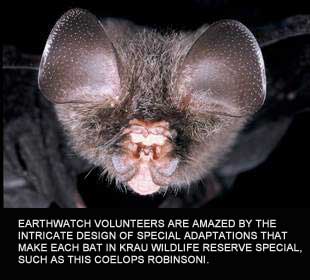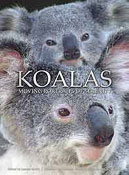Bats, more than just another pretty face
Dr. Tigga Kingston of Texas Tech University is conducting one of the most intensive studies of bat assemblages in the world, deep in Malaysia’s ancient rainforest. Earthwatch volunteers assisting Kingston gain new perspectives on the environment and the crucial role of these flying mammals in tropical ecology.
Most people view bats as disagreeable things that go bump in the night, but there is much more to these small, winged mammals. Earthwatch volunteers from around the world are traveling to Malaysia to explore the world of bats in the rich, lowland rainforest of Krau Wildlife Reserve.
 “This 30-million-year-old rainforest is a bat paradise,” said Dr. Tigga Kingston, assistant professor of biology at Texas Tech University and principal investigator of Earthwatch’s Malaysian Bat Conservation project. “It is home to the greatest diversity of insect-eating bats in the world, with at least 60 species. When the fruit-eating bats are included, the species list tops 71 bats.”
“This 30-million-year-old rainforest is a bat paradise,” said Dr. Tigga Kingston, assistant professor of biology at Texas Tech University and principal investigator of Earthwatch’s Malaysian Bat Conservation project. “It is home to the greatest diversity of insect-eating bats in the world, with at least 60 species. When the fruit-eating bats are included, the species list tops 71 bats.”
For four years, Earthwatch teams have been helping Kingston monitor bats in Krau Wildlife Reserve, using “harp” traps to capture the flying mammals and banding them for further study. Not only do volunteers gain a rare chance to explore parts of this ancient rainforest that are off-limits to tourists, they find a unique perspective on how important bats are.
“For me and the other volunteers on my expedition, this was an amazing opportunity to work with these animals up close,” said volunteer Ed Barker. “Bats are incredibly delicate, voracious insect eaters, with a highly sophisticated ability to move through the jungle. Helping to understand what role they play in forest ecosystems was really rewarding.”
Kingston recently summarized her four years of trapping at the 36th Annual North American Symposium on Bat Research, in Wilmington, NC, October 18-21. She reported nearly 16,000 bat captures at five sites, probably one the most intensive studies of bat “assemblages” in the world, including 38 species in six families.
Bat assemblages generally include all the bats in a given area. Kingston reported that bat assemblages in Krau Wildlife Reserve vary drastically from one site to another, and from one time to another. This finding poses new challenges for scientists studying the evolution of bats, as well as those trying to conserve bat populations in the face of deforestation and other threats.
Not only are bats a key component of Malaysian biodiversity, they also provide valuable pollination and seed dispersal services and do a booming business in insect removal. Kingston’s continued efforts will help local resource managers better manage this ancient rainforest, and the diversity of animals it supports.
“Earthwatch volunteers have been vital to the success of the project on so many levels,” said Kingston. “Not only does their labor make a major contribution to the somewhat arduous art of bat-catching, but their enthusiasm, curiosity, and appreciation buoys up the whole research team.”
Earthwatch teams will return to Malaysia to help Dr. Kingston in March, April, and July 2007. For more information about Earthwatch’s Malaysian Bat Conservation project, go to http://www.earthwatch.org/expeditions/kingston.html
Earthwatch Institute is a global volunteer organization that supports scientific field research by offering members of the public unique opportunities to work alongside leading field scientists and researchers. Earthwatch’s mission is to engage people worldwide in scientific field research and education to promote the understanding and action necessary for a sustainable environment. The year 2006 marks Earthwatch’s 35th anniversary. http://www.earthwatch.org
Be sure to watch A Year on Earth, a two-part special to debut on Discovery Kids Channel on December 3 and 10 and on Discovery HD on December 17. A Year on Earth chronicles the adventures of three American teens who join Dr. Tigga Kingston in Malaysia and several other Earthwatch research projects around the world. Together, they discover how ordinary people can make a difference in the most pressing environmental issues of our time.
Greener News Room
Keywords:: BATS, ECOLOGY, MALAYSIA, VOLUNTEER VACATIONS
Most people view bats as disagreeable things that go bump in the night, but there is much more to these small, winged mammals. Earthwatch volunteers from around the world are traveling to Malaysia to explore the world of bats in the rich, lowland rainforest of Krau Wildlife Reserve.
 “This 30-million-year-old rainforest is a bat paradise,” said Dr. Tigga Kingston, assistant professor of biology at Texas Tech University and principal investigator of Earthwatch’s Malaysian Bat Conservation project. “It is home to the greatest diversity of insect-eating bats in the world, with at least 60 species. When the fruit-eating bats are included, the species list tops 71 bats.”
“This 30-million-year-old rainforest is a bat paradise,” said Dr. Tigga Kingston, assistant professor of biology at Texas Tech University and principal investigator of Earthwatch’s Malaysian Bat Conservation project. “It is home to the greatest diversity of insect-eating bats in the world, with at least 60 species. When the fruit-eating bats are included, the species list tops 71 bats.”For four years, Earthwatch teams have been helping Kingston monitor bats in Krau Wildlife Reserve, using “harp” traps to capture the flying mammals and banding them for further study. Not only do volunteers gain a rare chance to explore parts of this ancient rainforest that are off-limits to tourists, they find a unique perspective on how important bats are.
“For me and the other volunteers on my expedition, this was an amazing opportunity to work with these animals up close,” said volunteer Ed Barker. “Bats are incredibly delicate, voracious insect eaters, with a highly sophisticated ability to move through the jungle. Helping to understand what role they play in forest ecosystems was really rewarding.”
Kingston recently summarized her four years of trapping at the 36th Annual North American Symposium on Bat Research, in Wilmington, NC, October 18-21. She reported nearly 16,000 bat captures at five sites, probably one the most intensive studies of bat “assemblages” in the world, including 38 species in six families.
Bat assemblages generally include all the bats in a given area. Kingston reported that bat assemblages in Krau Wildlife Reserve vary drastically from one site to another, and from one time to another. This finding poses new challenges for scientists studying the evolution of bats, as well as those trying to conserve bat populations in the face of deforestation and other threats.
Not only are bats a key component of Malaysian biodiversity, they also provide valuable pollination and seed dispersal services and do a booming business in insect removal. Kingston’s continued efforts will help local resource managers better manage this ancient rainforest, and the diversity of animals it supports.
“Earthwatch volunteers have been vital to the success of the project on so many levels,” said Kingston. “Not only does their labor make a major contribution to the somewhat arduous art of bat-catching, but their enthusiasm, curiosity, and appreciation buoys up the whole research team.”
Earthwatch teams will return to Malaysia to help Dr. Kingston in March, April, and July 2007. For more information about Earthwatch’s Malaysian Bat Conservation project, go to http://www.earthwatch.org/expeditions/kingston.html
Earthwatch Institute is a global volunteer organization that supports scientific field research by offering members of the public unique opportunities to work alongside leading field scientists and researchers. Earthwatch’s mission is to engage people worldwide in scientific field research and education to promote the understanding and action necessary for a sustainable environment. The year 2006 marks Earthwatch’s 35th anniversary. http://www.earthwatch.org
Be sure to watch A Year on Earth, a two-part special to debut on Discovery Kids Channel on December 3 and 10 and on Discovery HD on December 17. A Year on Earth chronicles the adventures of three American teens who join Dr. Tigga Kingston in Malaysia and several other Earthwatch research projects around the world. Together, they discover how ordinary people can make a difference in the most pressing environmental issues of our time.
Greener News Room
Keywords:: BATS, ECOLOGY, MALAYSIA, VOLUNTEER VACATIONS



2:13 PM









<< Home